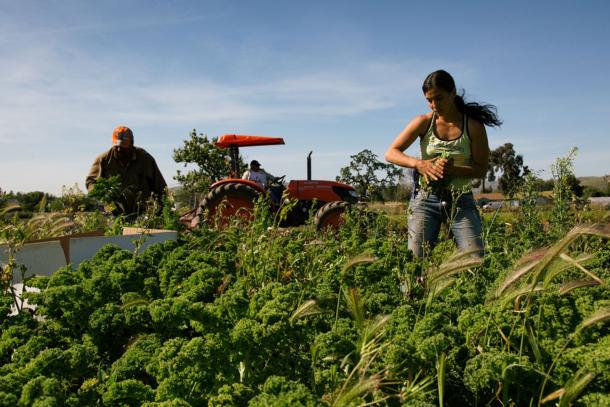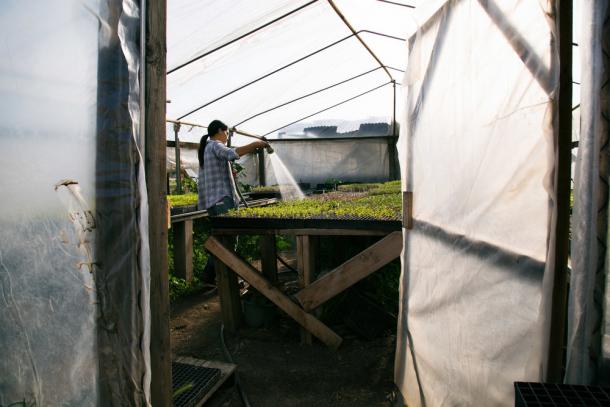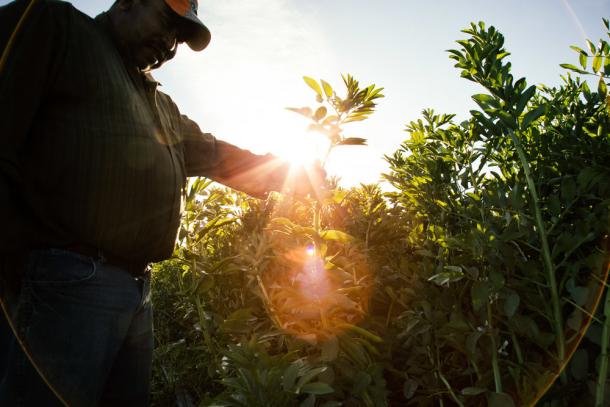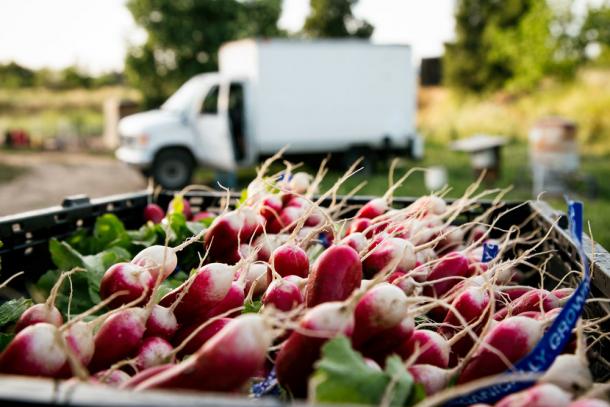Oya Organics Cultivates Family and Food Justice
By Sarah Tormey, CUESA Volunteer
April 21, 2017

Growing up in the Bay Area, Marsha Habib had little connection to agriculture, which made trips to her grandparents’ subsistence rice farm in Okayama, Japan, all the more memorable. Little did she know then that she would follow in her ancestors’ footsteps as a steward of the land.
Young farmers like Marsha are rare and needed now more than ever. According to the USDA Census of Agriculture, the number of women farmers and first-generation farmers has been in decline. Meanwhile, the average age of a farmer, reported as 58.3 in 2012, is steadily on the rise.
Now a businesswoman, young mother, and sustainability champion, Marsha founded Oya Organics, a small but powerful diversified organic farm in Hollister. Marsha and her farm family, “both biological and of the heart,” manage the land with love and awareness for the interconnectedness of people and ecosystems.
Farming as Service
As an idealistic young woman, Marsha studied agroecology and sustainable rural development at UC Berkeley, UniCamp in Brazil, and UC Santa Cruz. Her first farming experience came through the World Wide Opportunities on Organic Farms (WWOOF) program, where she experienced firsthand the many struggles small farmers face—from limited land access and labor, to overbearing competition from large industrial producers.
“That experience ignited in me a passion to want to work in agriculture to support small farmers,” says Marsha. “And I ended up becoming a small farmer myself.”
In 2010 while serving in AmeriCorps, she started a farm on an acre of subleased land, under a food justice project called Silicon Valley Health Corps. The farm brought together Latino farm workers, college students, and the urban community through field trips, ESL classes, and organic farming workshops, with the harvest going to those in need.
When funding for the project was cut and her AmeriCorps term ended, Marsha needed a job and didn’t want to see all of that work go to waste. She continued farming under the name Oya Organics, moved to a larger plot, and began working toward her organic certification.
“I started out through favors of other small farmers who had more experience,” she said. “I borrowed a tractor, and another farmer let me loose with their equipment. I didn’t even know how to drive a tractor when I came here.”
Sustainability for People and Earth
Through trial by fire, she found her way, steadily building her business through farmers markets, a CSA program, and restaurant and wholesale clients. After some coaxing, her partner, Modesto Sanchez Cruz, joined the effort. With a family who farmed in Oaxaca, he brought his own shoestring, low-input farming perspective to Oya.
The pair (along with their daughter, Saori) now runs a fully diversified farm with about a dozen employees they call their partners and family. On their sunny Central Valley farm, they rotate between 50 annual crops such as tomatoes, squash, brassicas, beans, peppers, and peas.
Social justice has remained close to the farm’s mission, with a keen awareness of the human aspects of sustainability. Marsha and Modesto believe in social justice from the ground up, paying and treating their workers fairly. With a diversity of crops to work with, employees vary their tasks hour to hour and day to day, which is better for the body and mind.
“We start in the morning with either a harvest that’s sensitive to the sun or weeding with hoes, then in the mid-day when it’s hot, we can be inside or do work that’s not as grueling,” explains Marsha.
First and second generation immigrants themselves, the couple has a deep reverence and respect for farm workers. “It’s one of the hardest jobs,” she says. “It’s difficult to cross the border, and you don’t see many American-born people doing work in the fields.”
Full Circle Farming
Farming requires care and attention not only to plants, but also to people, resource use, budgeting, marketing, and regulations. “It’s a huge job to create produce from soil, seed, sunshine, and water,” says Marsha.
In 2015, Oya Organics began working with Kitchen Table Advisors for small farm business consulting, which she says has been invaluable in helping her farm grow organically.
“I don’t want us to get big and just keep growing and growing,” Marsha adds. “I want to be at a scale where I know every acre of the farm and have a personal relationship with the plants and employees.”
This sort of high-touch farming also includes room for weeds and bugs. “We’re planting in various stages to avoid pest outbreaks. We have a lot of weeds, which is usually a good sign,” Marsha says, looking around fondly at the abundance in the valley heat. “We’re appreciating the life and the insects in our fields. We let cilantro go to flower every time we plant it, and that attracts some beneficial insects.”
For Marsha, holistic farming also means connecting people who grow food with people in the city, including those who might not otherwise be able to afford it. The farm works with community organizations to offer discounts to people in need, and donates produce to local shelters, food banks, and other projects.
At the end of the week, Oya’s workers bundle the fruits, vegetables, and herbs of their labor with care and take turns to personally deliver it directly to their shoppers. “I like to have our people in the field do farmers market at least once per week, so that they’re thanked for the work that they do and actually see the people who eat it,” Marsha says. “It brings it full circle.”
Welcome Oya Organics to the Thursday Ferry Plaza Farmers Market starting April 27.
This article is a part of an ongoing series highlighting CUESA farmers and ranchers mentored by Kitchen Table Advisors. Together, CUESA and Kitchen Table Advisors are supporting the economic viability of the next generation of sustainable small farms by offering critical market and promotion opportunities and in-depth business and financial advising. You can read more articles about businesses supported by CUESA and Kitchen Table Advisors here.
Photos by Brenton Gieser, courtesy of Kitchen Table Advisors.
Topics: Building Equity program, Farmers, Food justice, Kitchen Table Advisors, Organic



